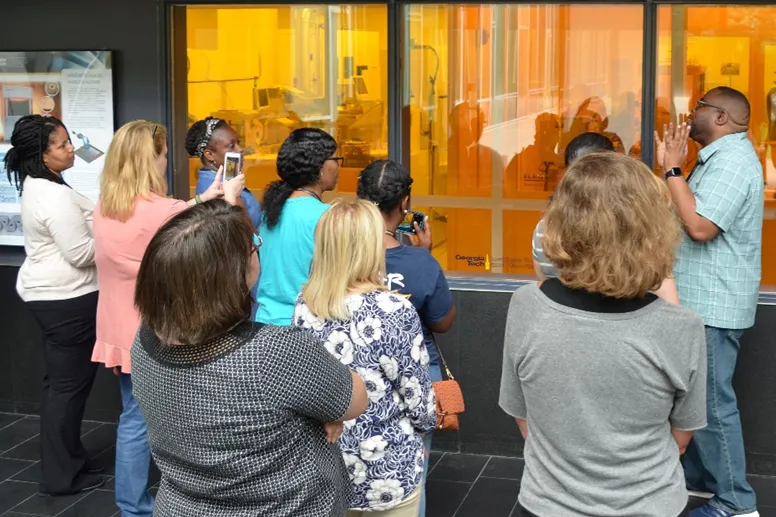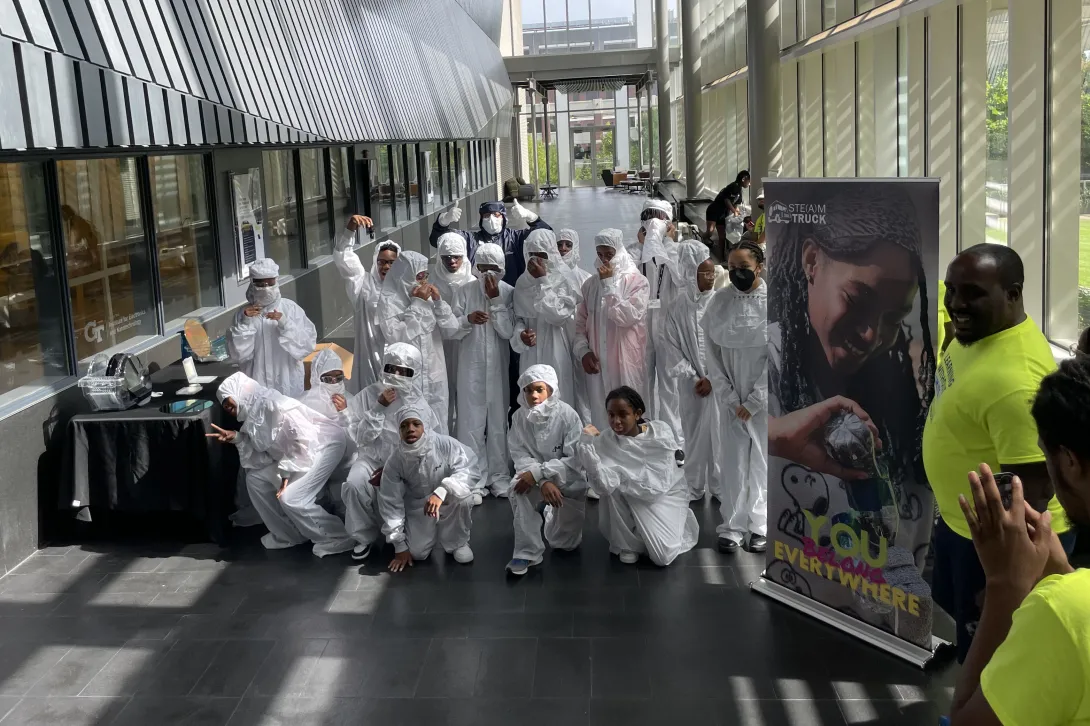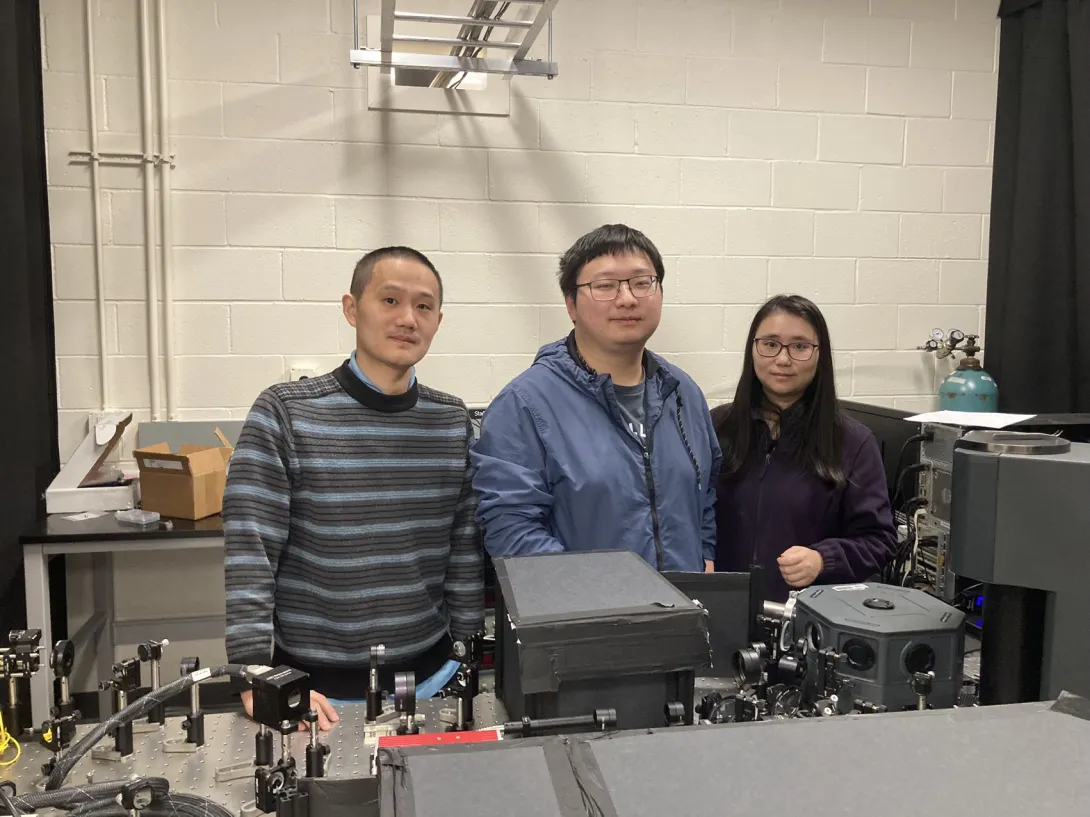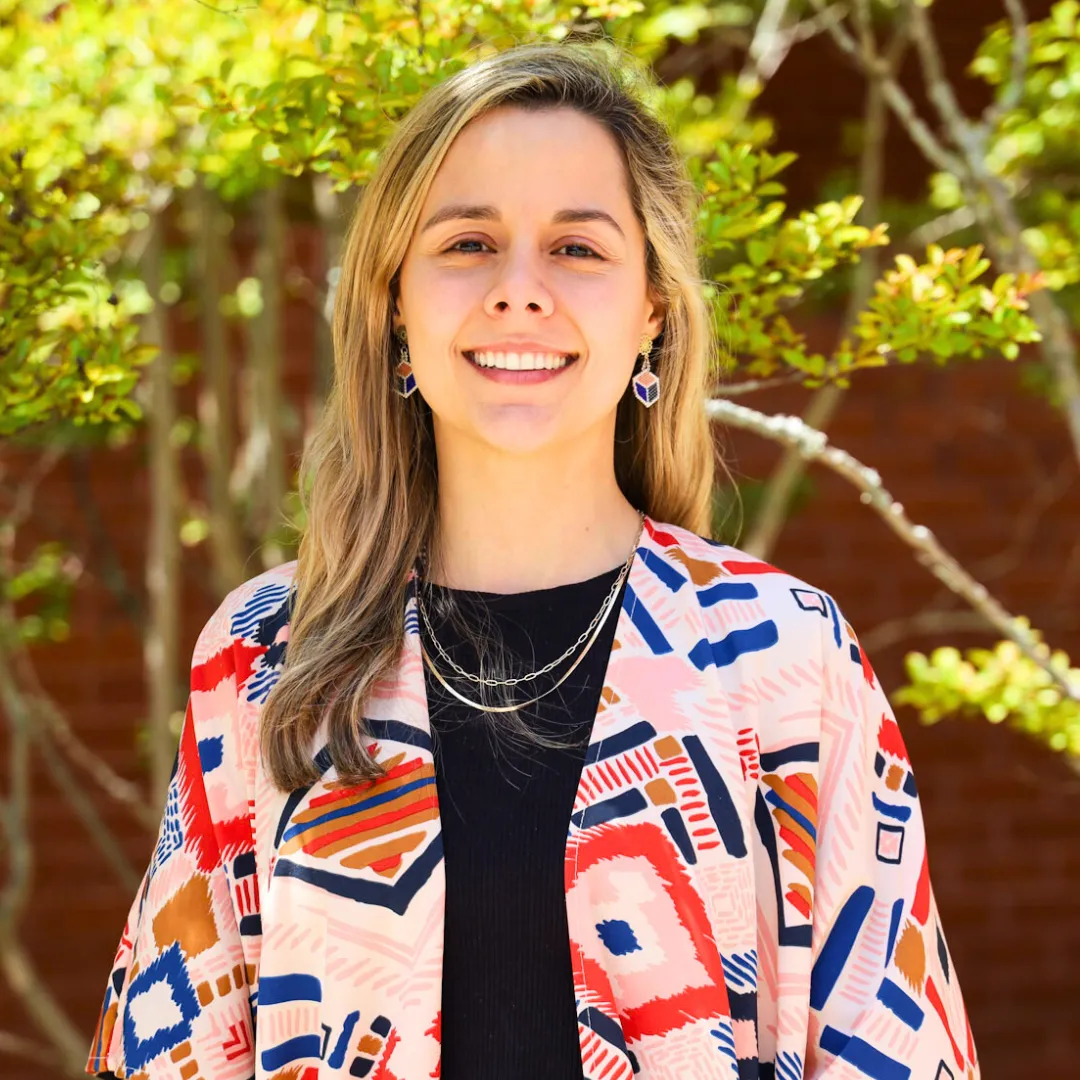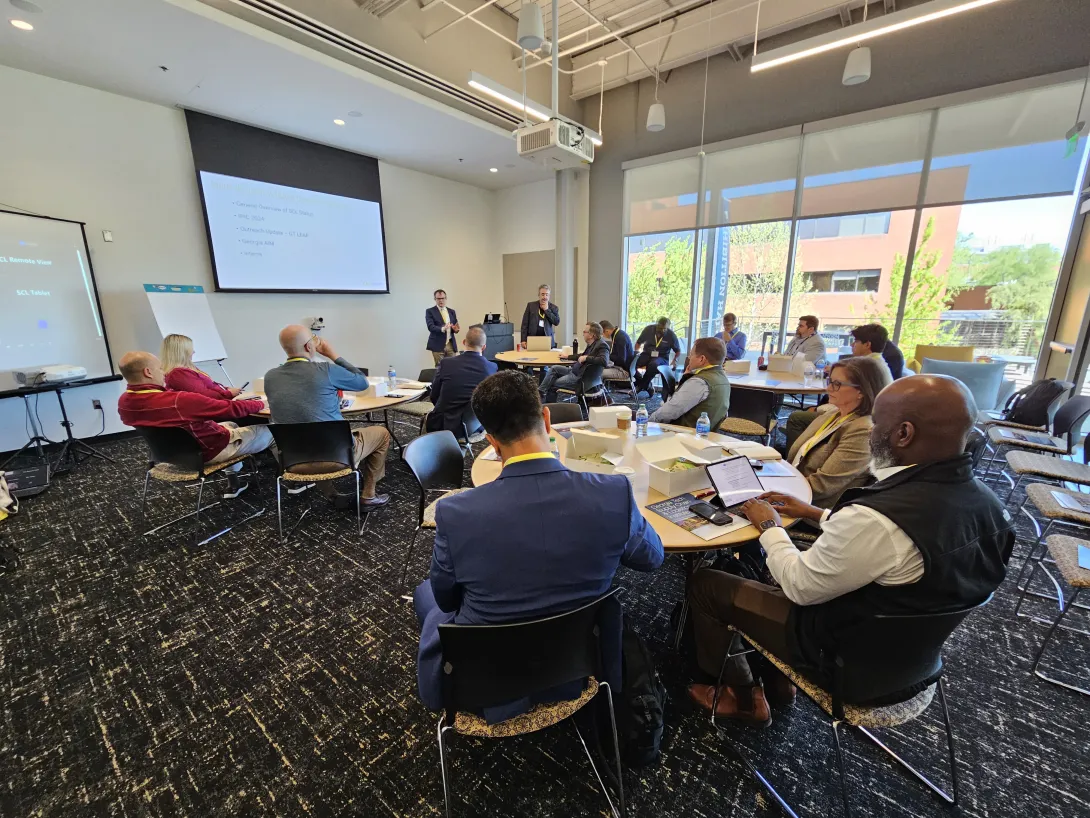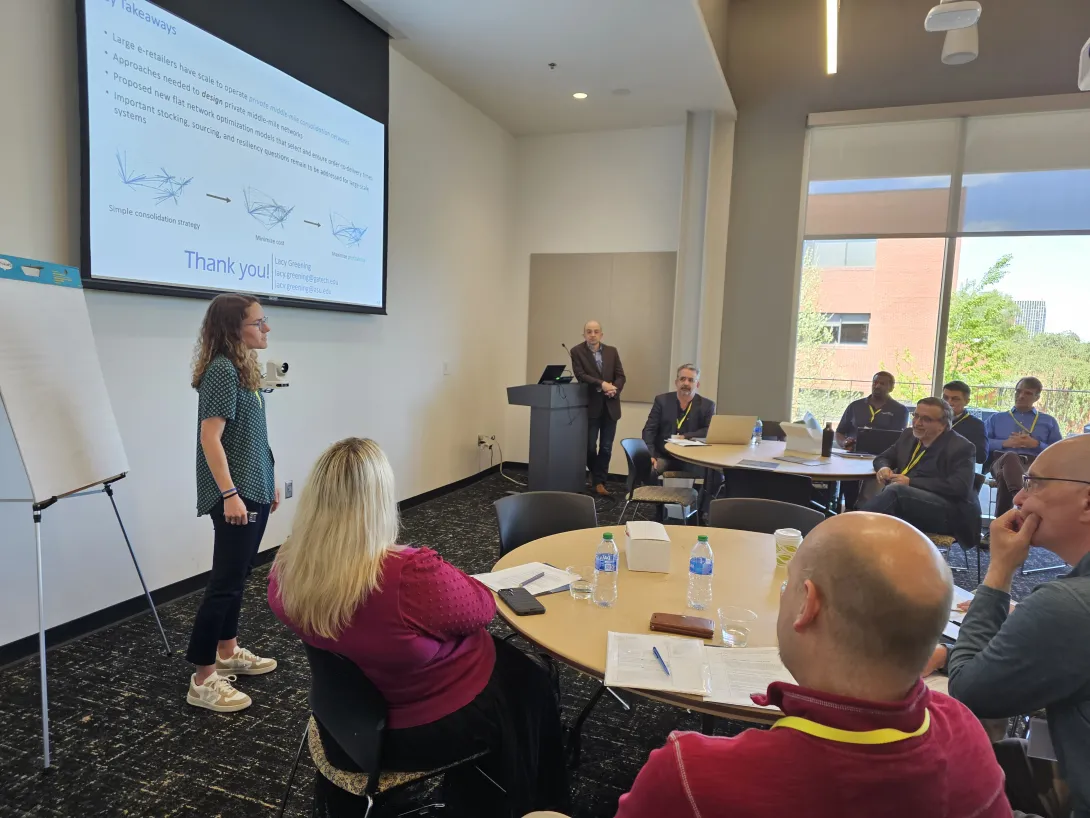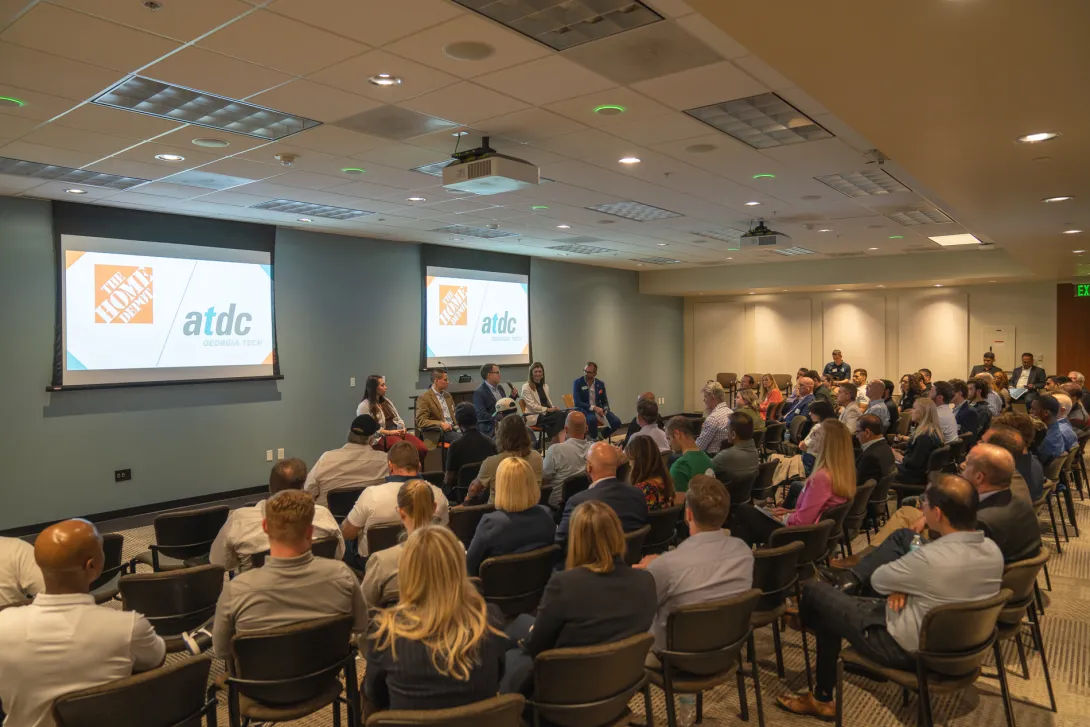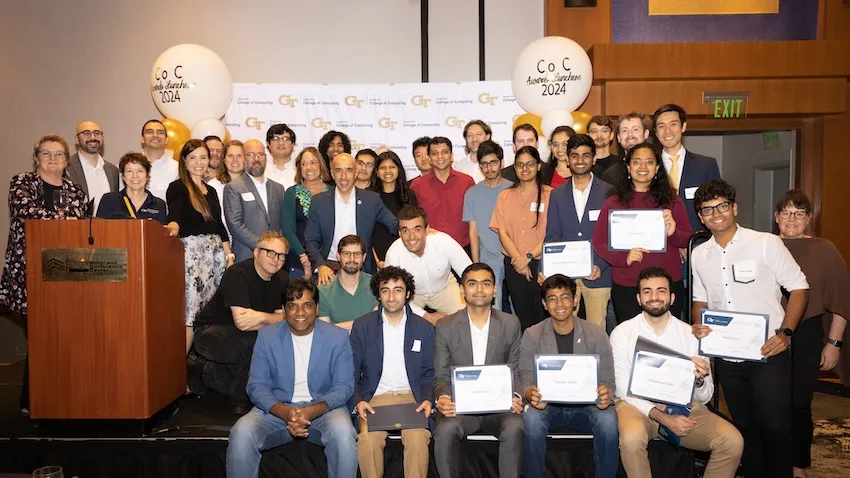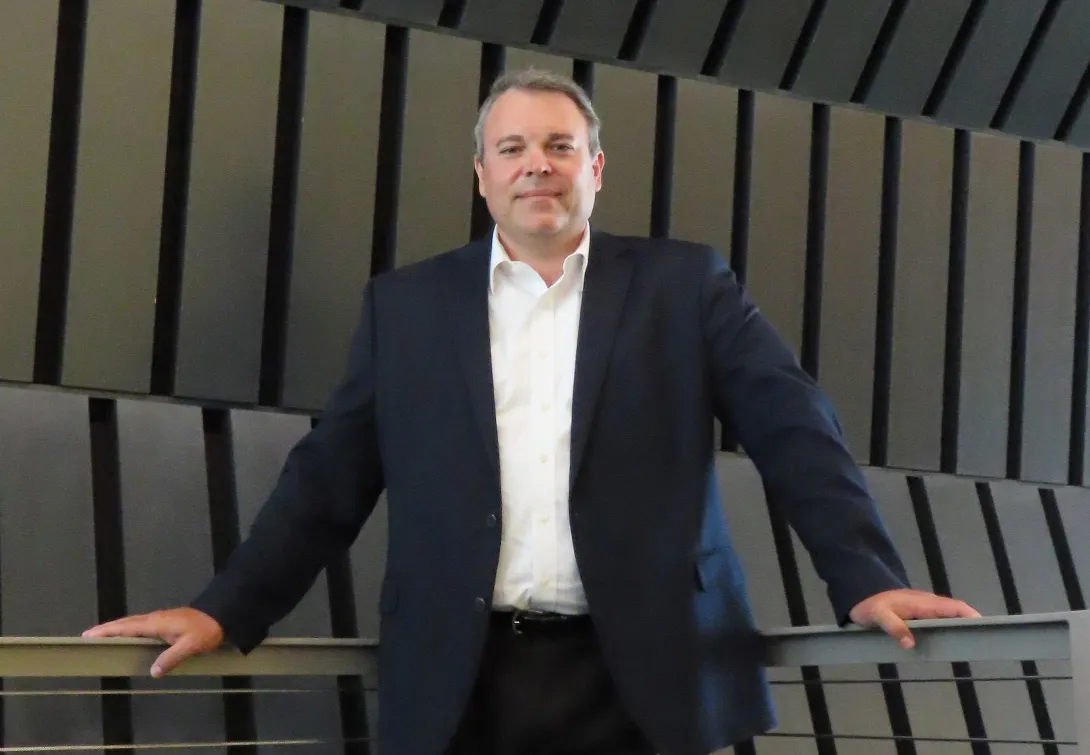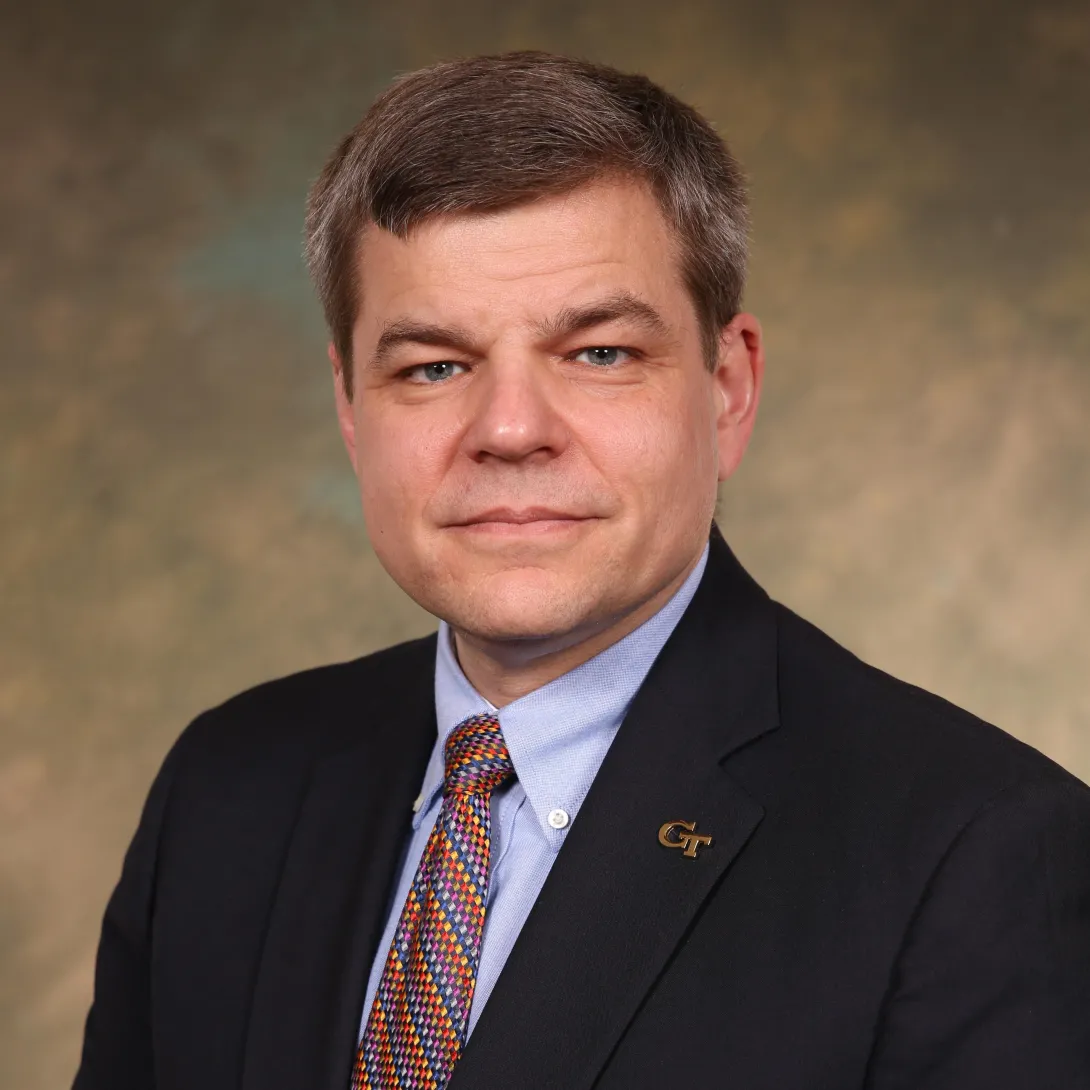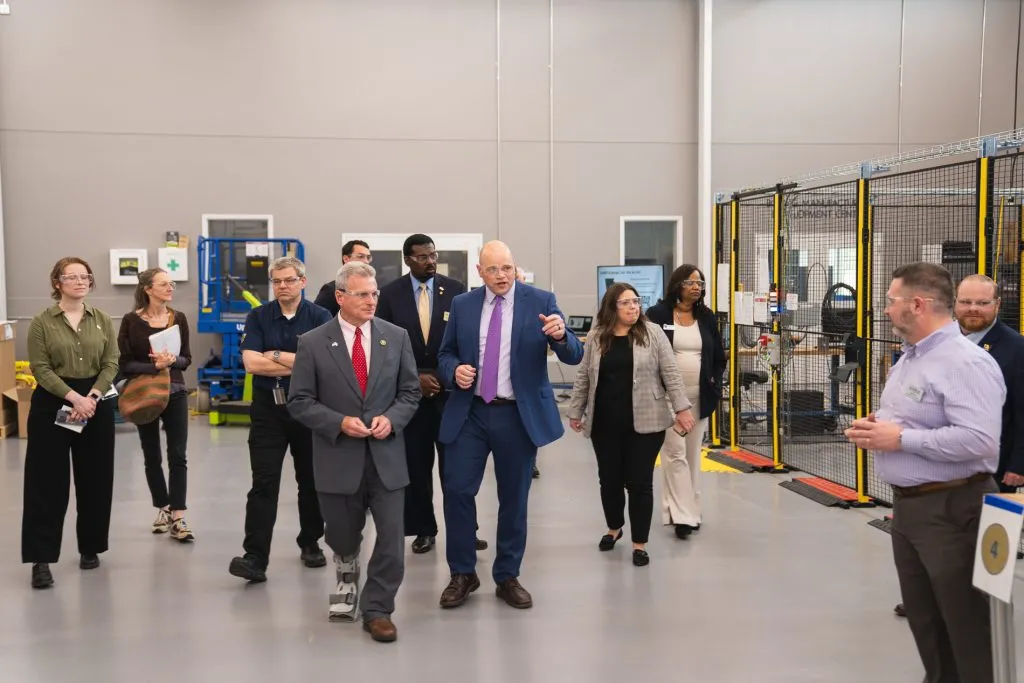May. 02, 2024
When Amy Bonecutter-Leonard was a second-semester undergraduate at the Georgia Institute of Technology, she applied for a work-study job in the cleanroom at the Microelectronics Research Center (MiRC). There, she learned process techniques for making the same type of electronic chips used in cellphones.
With this new knowledge, she could train and help other students with their research. At the time, Bonecutter-Leonard was a chemical engineering major with no plans to go into microelectronics. Working in the cleanroom changed that.
“I fell in love with microelectronics through exposure to the research and development work performed in the cleanroom,” she said.
What started as a student job led to her taking microelectronics classes — and eventually to a career in the field. “My work-study prepared me with hands-on technical skills I would have never learned from just being in a classroom,” she said. Now, Bonecutter-Leonard works as a microelectronics business chief engineer at defense contractor L3Harris Technologies.
Her story is one of many from the Institute for Electronics and Nanotechnology (IEN, the successor to MiRC), which has been training students from kindergarten to graduate school to be leaders in the microelectronics and nanotechnology space. The goal of IEN’s outreach is to make nanotechnology and microelectronics — such as computer chips and sensors — as accessible as any other science. Ultimately, these efforts will build up the U.S. workforce in the field, ensuring the country remains at the forefront of the technology that powers Americans’ everyday lives.
Building the Workforce
Bolstering the number of workers in the microelectronics industry is imperative to keep the U.S. globally competitive. Right now, 40% of the industry's labor force is older than 50, with practitioners aging out of their careers at a pace new talent cannot match. Additionally, heavy educational barriers to entry, including required degrees and specialized training, prevent more people from pursuing careers in the field. Without dedicated efforts, the entire sector — and the nation — will fall behind.
IEN is working to solve this pipeline problem.
“With the national semiconductor workforce aging, it is important now more than ever that we educate the next generation to move into these jobs,” said Michael Filler, IEN’s interim executive director. “IEN is proud to support the semiconductor industry by providing students with the interdisciplinary skills and hands-on technical training essential for success in this fast-paced, global field.”
Georgia Tech is uniquely positioned to lead this charge with its 28,500 square feet of academic cleanroom space, the largest in the Southeast and among the largest in the U.S. From micro-electro-mechanical systems to electronics fabrication, workers have 100 bays in which to conduct leading-edge research. These cleanrooms are also key teaching and training facilities.
IEN invites anyone from around the world, whether affiliated with the Institute or not, to become a core user of the cleanroom facilities. The center also regularly hosts short courses for external partners — academic, industry, and government — in microfabrication and soft lithography for microfluidics. Over the past three years, more than 700 people went through new-user orientation, and 193 enrolled in the short courses.
Teaching the Next Generation
Making nanotechnology — of which microelectronics is an example — educationally accessible begins before college. Each semester, more than 800 K-12 students participate in IEN’s Introduction to Nanotechnology virtual lesson. Associate Director for Education and Outreach Mikkel Thomas begins his presentations by asking a simple question: What do you know about nanotechnology?
“About 99% of the time, they say that’s what makes Ironman’s suit work,” said Thomas. “That means they’ve learned the wrong lesson — that nanotechnology is a futuristic tech and that you have to be as smart as Tony Stark to work in the field.
“But most people interact with nanotechnology multiple times throughout their day, and they have no idea they're doing it.”
Thomas also emphasizes there is a career path for everyone, even if they don’t plan to get a traditional four-year degree. Part of IEN’s workforce development initiative is to build up the entire pipeline from industry and research lab technicians at the certificate level to postdoctoral researchers.
“It’s important for us to reach kids who don’t know what career options are available in nanotechnology,” Thomas said. “We want them to know that whatever they're interested in, there is a pathway for them.”
Sixth- through eighth-grade students sparked by this conversation can attend Chip Camp, a three-day STEM summer camp sponsored by Micron. They begin with a day at IEN to learn about thin films, magic sands, ferrofluids, and measuring their height in nanometers. The rest of the camp features hands-on visits to the Materials Characterization Facility (MCF) and the IEN cleanroom, where they can try on the white “bunny suits” technicians wear in the lab.
To further their reach, IEN’s workforce development team collaborates with teachers to bring nanotechnology into classrooms. During the summer, IEN offers the Research Experience for Teachers, a training program for public school and community college teachers to conduct nanotechnology research and learn how to incorporate it into their lessons. Middle school teachers have similar opportunities through the Nanoscience Summer Institute for Middle School Teachers.
Training the Workforce
When these students get to a university like Georgia Tech, IEN hires them for work-study jobs like the one Bonecutter-Leonard had. The hands-on cleanroom training is also vital to graduate students pursuing advanced degrees.
Katie Young earned her Ph.D. in materials science and engineering at Georgia Tech. Learning her way around the IEN cleanroom was essential for her graduate studies.
“My dissertation research involved synthesizing two-dimensional materials — only a single atom thick — for permeation barriers,” she explained. “I often used the cleanroom’s vacuum systems to synthesize and process 2D materials.” Now a research scientist at the Georgia Tech Research Institute, Young still works in the cleanroom on semiconductor device fabrication, building prototype quantum and biological sensors.
IEN opportunities are not limited to graduate research. Annually, about 150 Georgia Tech undergraduate students take microelectronics packaging and devices classes, with labs taught by IEN staff in the teaching cleanroom. These courses include Integrated Circuit Fabrication (ECE 4452), in which students learn to fabricate circuit elements, and the Science and Engineering of Microelectronic Fabrication (ChBE 4050/6050, open to graduate students as well), for students interested in semiconductor materials and fabrication.
Students don’t need to enroll at Georgia Tech to benefit from training, courses, and other opportunities. IEN’s internship program provides technical college students with training to become microelectronics technicians, either through work in the Biocleanroom or in the MCF.
Empowering Future Innovators
IEN also participates in the National Science Foundation Research Experiences for Undergraduates (REU), which provides opportunities for students from underrepresented groups or who attend schools without similar facilities. While enrolled at another university, John Mark Page was introduced to Georgia Tech’s cleanroom through an REU.
“That was my first exposure to any facility of this kind, and it felt like I was looking at the future. Being in a facility that can fabricate devices at or near the atomic level — it was hard to fathom,” Page said. “I had never thought that participating in microelectronics and nanotechnology as a student, especially as an undergraduate, was something I could do.”
As a result of his REU, Page transferred to Georgia Tech — he will graduate this summer with a bachelor’s degree in electrical engineering. He also completed a second REU at the University of North Carolina at Chapel Hill, worked as a student assistant in the IEN cleanroom, and participated in a Vertically Integrated Project (VIP), Chip Scale Power and Energy.
“I was interested in the VIP because it allowed me to spend more time in the cleanroom, familiarizing myself with semiconductor fabrication methods and training on new fabrication equipment,” Page explained. His experiences inspired him to consider a future career in the semiconductor industry.
“It wasn’t only the 10-week experience of the REU that made a lasting impact on me,” he said. “It was also the relationships formed with the people of IEN. The staff there are exceptional representatives of Georgia Tech, and they make IEN a tremendous asset to the future of microelectronics and nanotechnology in the U.S.”
Biya Haile, an ECE Ph.D. student, had a similarly meaningful REU experience. Haile, whose research focuses on creating micro-electro-mechanical systems-based sensors (MEMS), described the REU as “immersive.”
“The REU project enabled me to study chemical micro-sensor technologies, as well as state-of-the-art additive nano-manufacturing techniques, which has contributed to my research,” he said. “I feel lucky that my academic journey has entailed developing new technologies that use nanoscience to solve big problems.”
While Haile is currently focused more on designing and testing rapid processes for fabricating MEMS-based devices, he still occasionally works in the cleanroom on fabrication. He plans to go into the microelectronics industry after graduating.
The Path Ahead
All of IEN’s training and educational offerings align with IEN’s mission to bolster and diversify the microelectronics workforce, according to George White, senior director of strategic partnerships for the Georgia Tech research enterprise. “IEN has been at the forefront of the CHIPS infrastructure buildout, particularly in the area of education and workforce development,” he noted.
IEN’s efforts impact not just Atlanta but the entire country. Georgia Tech’s leadership in microelectronics research trains the innovators and practitioners of the future everywhere and ensures that America stays at the forefront of leading-edge technology. As demand increases for microelectronics, IEN is moving to meet it.
Effective July 1, 2024, the Institute for Electronics and Nanotechnology and the Institute for Materials will evolve into the Institute for Matter and Systems (IMS). This strategic union aims to foster convergent research at Georgia Tech, focusing on the science, technology, and societal underpinnings of cutting-edge materials and devices. Eric Vogel will be the director of IMS, and Michael Filler will be the deputy director.
May. 02, 2024
Quantum sensors detect the smallest of environmental changes — for example, an atom reacting to a magnetic field. As these sensors “read” the unique behaviors of subatomic particles, they also dramatically improve scientists’ ability to measure and detect changes in our wider environment.
Monitoring these tiny changes results in a wide range of applications — from improving navigation and natural disaster forecasting, to smarter medical imaging and detection of biomarkers of disease, gravitational wave detection, and even better quantum communication for secure data sharing.
Georgia Tech physicists are pioneering new quantum sensing platforms to aid in these efforts. The research team’s latest study, “Sensing Spin Wave Excitations by Spin Defects in Few-Layer Thick Hexagonal Boron Nitride” was published in Science Advances this week.
The research team includes School of Physics Assistant Professors Chunhui (Rita) Du and Hailong Wang (corresponding authors) alongside fellow Georgia Tech researchers Jingcheng Zhou, Mengqi Huang, Faris Al-matouq, Jiu Chang, Dziga Djugba, and Professor Zhigang Jiang and their collaborators.
An ultra-sensitive platform
The new research investigates quantum sensing by leveraging color centers — small defects within crystals (Du’s team uses diamonds and other 2D layered materials) that allow light to be absorbed and emitted, which also give the crystal unique electronic properties.
By embedding these color centers into a material called hexagonal boron nitride (hBN), the team hoped to create an extremely sensitive quantum sensor — a new resource for developing next-generation, transformative sensing devices.
For its part, hBN is particularly attractive for quantum sensing and computing because it could contain defects that can be manipulated with light — also known as "optically active spin qubits."
The quantum spin defects in hBN are also very magnetically sensitive, and allow scientists to “see” or “sense” in more detail than other conventional techniques. In addition, the sheet-like structure of hBN is compatible with ultra-sensitive tools like nanodevices, making it a particularly intriguing resource for investigation.
The team’s research has resulted in a critical breakthrough in sensing spin waves, Du says, explaining that “in this study, we were able to detect spin excitations that were simply unattainable in previous studies.”
Detecting spin waves is a fundamental component of quantum sensing, because these phenomena can travel for long distances, making them an ideal candidate for energy-efficient information control, communication, and processing.
The future of quantum
“For the first time, we experimentally demonstrated two-dimensional van der Waals quantum sensing — using few-layer thick hBN in a real-world environment,” Du explains, underscoring the potential the material holds for precise quantum sensing. “Further research could make it possible to sense electromagnetic features at the atomic scale using color centers in thin layers of hBN.”
Du also emphasizes the collaborative nature of the research, highlighting the diverse skill sets and resources of researchers within Georgia Tech.
“Within the School of Physics, Professor Zhigang Jiang's research group provided the team with high-quality hBN crystals. Jingcheng Zhou, who is a member of both Professor Hailong Wang’s and my research teams, performed the cutting-edge quantum sensing measurements,” she says. “Many incredible students also helped with this project.”
Du is a leading scientist in the field of quantum sensing — this year, she received a new grant from the U.S. Department of Energy, along with a Sloan Research Fellowship for her pioneering work on developing state-of-the-art quantum sensing techniques for quantum information technology applications. The prestigious Sloan award recognizes researchers whose “creativity, innovation, and research accomplishments make them stand out as the next-generation of leaders in the fields.”
This work is supported by the U. S. National Science Foundation (NSF) under award No. DMR-2342569, the Air Force Office of Scientific Research under award No. FA9550-20-1-0319 and its Young Investigator Program under award No. FA9550-21-1-0125, the Office of Naval Research (ONR) under grant No. N00014-23-1-2146, NASA-REVEALS SSERVI (CAN No. NNA17BF68A), and NASA-CLEVER SSERVI (CAN No. 80NSSC23M0229).
News Contact
Written by Selena Langner
Contact: Jess Hunt-Raston
Director of Communications
College of Sciences at Georgia Tech
May. 01, 2024
Georgia Tech’s AI Hub will be directed by Pascal Van Hentenryck, announced Chaouki Abdallah, executive vice president for Research. Van Hentenryck, A. Russell Chandler III Chair and professor in the H. Milton Stewart School of Industrial and Systems Engineering, also directs the NSF Artificial Intelligence Institute for Advances in Optimization (AI4OPT).
Georgia Tech has been actively engaged in artificial intelligence (AI) research and education for decades. Formed in 2023, the AI Hub is a thriving network, bringing together over 1000 faculty and students who work on fundamental and applied AI-related research across the entire Institute.
“Pascal Van Hentenryck will drive innovation and excellence at the helm of Georgia Tech’s AI Hub,” said Abdallah. “His leadership of one of our three AI institutes has already shown his dedication to fostering impactful partnerships and cultivating a dynamic ecosystem for AI progress at Georgia Tech and beyond.”
The AI Hub aims to advance AI through discovery, interdisciplinary research, responsible deployment, and education to build the next generation of the AI workforce, as well as a sustainable future. Thanks to Tech’s applied, solutions-focused approach, the AI Hub is well-positioned to provide decision makers and stakeholders with access to world-class resources for commercializing and deploying AI.
“A fundamental question people are asking about AI now is, ‘Can we trust it?’” said Van Hentenryck. “As such, the AI Hub’s focus will be on developing trustworthy AI for social impact — in science, engineering, and education.”
U.S. News & World Report has ranked Georgia Tech among the five best universities with artificial intelligence programs. Van Hentenryck intends for the AI Hub to leverage the Institute’s strategic advantage in AI engineering to create powerful collaborations. These could include partnerships with the Georgia Tech Research Institute, for maximizing societal impact, and Tech’s 10 interdisciplinary research centers as well as its three NSF-funded AI institutes, for augmenting academic and policy impact.
“The AI Hub will empower all AI-related activities, from foundational research to applied AI projects, joint AI labs, AI incubators, and AI workforce development; it will also help shape AI policies and improve understanding of the social implications of AI technologies,” Van Hentenryck explained. “A key aspect will be to scale many of AI4OPT’s initiatives to Georgia Tech’s AI ecosystem more generally — in particular, its industrial partner and workforce development programs, in order to magnify societal impact and democratize access to AI and the AI workforce.”
Van Hentenryck is also thinking about AI’s technological implications. “AI is a unifying technology — it brings together computing, engineering, and the social sciences. Keeping humans at the center of AI applications and ensuring that AI systems are trustworthy and ethical by design is critical,” he added.
In its first year, the AI Hub will focus on building an agile and nimble organization to accomplish the following goals:
facilitate, promote, and nurture use-inspired research and innovative industrial partnerships;
translate AI research into impact through AI engineering and entrepreneurship programs; and
develop sustainable AI workforce development programs.
Additionally, the AI Hub will support new events, including AI-Tech Fest, a fall kickoff for the center. This event will bring together Georgia Tech faculty, as well as external and potential partners, to discuss recent AI developments and the opportunities and challenges this rapidly proliferating technology presents, and to build a nexus of collaboration and innovation.
News Contact
Shelley Wunder-Smith
Director of Research Communications
Apr. 26, 2024
"Engineering solutions should not only solve problems but also address the societal and environmental impacts they create," states Professor Sofia Perez-Guzman, emphasizing the holistic approach to engineering at Georgia Tech.
Perez-Guzman's philosophy underscores her dual roles in the School of Civil and Environmental Engineering (CEE) and the H. Milton Stewart School of Industrial and Systems Engineering(ISyE).
In her roles, she applies her comprehensive academic background to deepen the understanding of engineering’s broader implications, focusing on how these fields impact society and the environment.
Academic Steps in Resilient Engineering
Perez-Guzman's scholarly journey originated in Colombia at the Universidad del Valle, where she earned a Bachelor's degree in Industrial Engineering.
Her academic ambition propelled her to the United States, where she pursued a Master's degree in Transportation Engineering and a Master’s degree in Economics at Rensselaer Polytechnic Institute (RPI).
During her Master's studies, she engaged in research focused on the economics of freight transportation and its role in food deserts. She developed an analytical model to understand the formation of areas underserved by food supply chains.
Perez-Guzman's educational achievements culminated in a Ph.D. in Transportation Engineering from RPI in December 2022.
Her doctoral thesis centered on the realm of disaster response logistics, where she created humanitarian (beneficiary-oriented) analytical models for the distribution of relief goods in post-disaster scenarios.
Emphasizing her unwavering commitment to enhancing the robustness and sustainability of supply chains, Perez-Guzman aims to bridge the divide between traditional responses and visionary foresight.
Research and Teaching Pedagogy
Her current research explores the societal impact of supply chains, specifically through the lens of freight transportation.
This work seeks to develop decision-making support tools that address complex societal challenges where freight transportation plays a crucial role in either contributing to societal issues or helps in facilitating solutions.
In the classroom, Perez-Guzman translates these complex research themes into digestible, actionable lessons. She is currently instructing an undergraduate course dedicated to Multimodal Transportation and is set to introduce a new graduate course on Freight Transportation in the Spring semester.
"Our focus must be on developing research that is not only theoretically robust but also practical and implementable for those deploying these solutions in real-world scenarios. By understanding the needs of end-users and delivering tools that practitioners can readily employ, we move one step closer to making a tangible impact on the field."
Transitioning from theory to practice, she envisions her students as future leaders who’ll prioritize long-term sustainability and resilience in their professional endeavors, contributing to the creation of smarter, more adaptable transportation systems and supply chains systems globally.
Molding Holistic Supply Chain Leaders
Amidst these advanced theoretical and practical frameworks, Perez-Guzman encourages her students to further personalize their educational journey.
For students aiming to propel their career in Supply Chain management, Perez-Guzman encourages students to specialize and excel in a specific interest area.
"Dive deeper into your studies and seek out academic challenges beyond the syllabus. Engaging in competitions and embracing every learning opportunity your institution offers can equip you with a distinctive advantage. Remember, the aim is to distinguish yourself with specialized knowledge or skills.”
Additionally, Perez-Guzman emphasized a crucial blend of technical prowess and soft skills for students venturing into supply chain management.
"Georgia Tech students boast exceptional technical skills, a point that's well acknowledged. However, there's an increasing need for them to also focus on developing their soft skills, like communication, both oral and written. Modern companies seek more than just outstanding coders or data scientists; they require professionals who can translate complex theories, algorithms, and results into digestible content which is essential for decision-making. Therefore, it's crucial for our students to develop these soft skills to fully meet the interdisciplinary needs of the future."
Author: Atharva Anand Dave
Apr. 25, 2024
On April 12, 2024, Georgia Tech's Supply Chain and Logistics Institute (SCL) hosted a productive meeting of its Industry Advisory Board (IAB), bringing together key stakeholders from industry and academia to shape the future of supply chain education and research. The agenda commenced with a pre-meeting social, fostering networking opportunities among IAB members, faculty, and industry guests. Following a welcome by Professor Benoit Montreuil (SCL Executive Director), the SCL leadership team provided updates on the institute's progress and addressed common questions, setting the stage for dynamic discussions.
Representatives from leading companies joined the meeting, reflecting the broad industry interest in shaping the future of supply chain education and research. Attending companies included: Amazon, Americold, Cisco, Coca-Cola, Dematic, Georgia Center of Innovation in Logistics, Graphic Packaging International, The Home Depot, Georgia Ports Authority, Hartsfield-Jackson Atlanta International Airport, Michelin North America, MiTek, Newell Brands, Steelcase, UPS.
Professors Frederick Benaben and Chris Gaffney (SCL Managing Director) led a session on professional and lifelong supply chain education, seeking input on future strategies. Participants, including representatives from The Home Depot and Steelcase, emphasized the importance of practical application and cohesive program structures to maximize learning outcomes. This emphasis resonates with SCL's mission to bridge the gap between academia and industry, ensuring that educational offerings are not only rigorous but also relevant and applicable to real-world scenarios.
Infrastructure and logistics at a societal level took center stage, with discussions ranging from state-level initiatives in Georgia to novel ideas under ARPA-I. By exploring state-level initiatives, such as responses to the GA Senate Infrastructure Ask and collaborations with organizations like the Georgia Center of Innovation and the Atlanta Regional Commission, participants delved into how strategic partnerships and policy decisions can drive positive outcomes at scale.
Professor Alejandro Toriello (SCL Scientific Director) provided insights into ongoing research efforts, followed by faculty spotlights on AI and machine learning by Assistant Professor Tuo Zhao, shedding light on breakthroughs in natural language AI. Research students Dipayan Banerjee (Topic: Tactical Planning for Same-Day Delivery) and Lacy Greening (Topic: E-Commerce Fulfillment Network Planning) gave excellent presentations on innovative approaches to last-mile delivery and e-commerce network design, respectively, garnering interest from practitioners in attendance.
Chris Gaffney led discussions on the future of partnerships, seeking input on enhancing collaboration between academia and industry. Attendees emphasized the need for deeper engagement and a clearer understanding of the institute's capabilities. White space discussions highlighted areas for further exploration, including cybersecurity, sustainability, and diversity in the supply chain space. Attendee feedback underscored the importance of diverse perspectives and thought leadership in driving innovation.
The meeting concluded with plans for future engagement and reaffirming Georgia Tech's commitment to serving as a catalyst for industry advancements.
Apr. 24, 2024
On Tuesday, April 16th, Georgia Tech Supply Chain and Logistics Institute (SCL) Managing Director Chris Gaffney joined SVP Stephanie Smith and Director Gonzalo Cordova from The Home Depot along with Emilie Schario, Founder and CEO of Turbine, and Georgia Tech Advanced Technology Development Center (ATDC) Supply Chain Catalyst Alex Rhodeen for a dynamic panel discussion on the state of Supply Chain, the role of AI, and where we're headed next. As part of the discussion, the panel addressed issues on globalization, geopolitical tensions, sustainability concerns, and the impact of natural disasters on supply chains. The panelists also provided examples of how AI technologies such as machine learning, predictive analytics, and robotic process automation are being used to optimize various aspects of the supply chain, from demand forecasting to inventory management to logistics. The group stressed the role of AI and how it will be pivotal in shaping the future of supply chain management through fostering agility, sustainability, and competitive advantage. In addition to the panel, more than 20 ATDC companies participated in a showcase to present their solutions to the Georgia Tech startup ecosystem.
This event was part of ATDC's Supply Chain vertical, generously supported by The Home Depot. As a key component of this collaboration, Home Depot executives mentor program participants and offer guidance and expertise as they build, test, and bring new products and services to market. The initiative aims to drive innovation and nurture the growth of startups in the supply chain and logistics sector, leveraging the robust expertise and infrastructure available in Georgia. Given the evolving landscape of supply chain and logistics, partnerships with program participants are increasingly vital for early-stage companies, facilitating customer acquisition and business model development. The Supply Chain vertical is the sixth of its kind at ATDC, a globally recognized technology incubator, and follows other targeted programs in health, retail, and financial technologies. Through collaboration with SCL, ATDC fosters the innovation of Georgia-grown supply chain solutions.
ABOUT ATDC
The Advanced Technology Development Center (ATDC), a program of the Georgia Institute of Technology, is the state of Georgia’s technology startup incubator. Founded in 1980 by the Georgia General Assembly which funds it each year, ATDC’s mission is to work with entrepreneurs in Georgia to help them learn, launch, scale, and succeed in the creation of viable, disruptive technology companies. Since its founding, ATDC has grown to become the longest running and one of the most successful university-affiliated incubators in the United States, with its graduate startup companies raising $3 billion in investment financing and generating more than $12 billion in revenue in the state of Georgia. ATDC brings a unique framework that combines its startup curriculum, coaching, connections, and community, as well as direct access to Georgia Tech resources, research expertise, and student talent, to help entrepreneurs learn, launch, scale, and succeed. In this effort, ATDC will offer programming, recruit and evaluate startups, and hire staff to manage the vertical. Learn more at atdc.org.
Apr. 23, 2024
The College of Computing’s countdown to commencement began on April 11 when students, faculty, and staff converged at the 33rd Annual Awards Celebration.
The banquet celebrated the college community for an exemplary academic year and recognized the most distinguished individuals of 2023-2024. For Alex Orso, the reception was a high-water mark in his role as interim dean.
“I always say that the best part about my job is to brag about the achievements and accolades of my colleagues,” said Orso.
“It is my distinct honor and privilege to recognize these award winners and the collective success of the College of Computing.”
Orso’s colleagues from the School of Computational Science and Engineering (CSE) were among the celebration’s honorees. School of CSE students, faculty, and alumni earning awards this year include:
- Grace Driskill, M.S. CSE student - The Donald V. Jackson Fellowship
- Harshvardhan Baldwa, M.S. CSE student - The Marshal D. Williamson Fellowship
- Mansi Phute, M.S. CS student- The Marshal D. Williamson Fellowship
- Assistant Professor Chao Zhang- Outstanding Junior Faculty Research Award
- Nazanin Tabatbaei, teaching assistant in Associate Professor Polo Chau’s CSE 6242 Data & Visual Analytics course- Outstanding Instructional Associate Teaching Award
- Rodrigo Borela (Ph.D. CSE-CEE 2021), School of Computing Instruction Lecturer and CSE program alumnus - William D. "Bill" Leahy Jr. Outstanding Instructor Award
- Pratham Metha, undergraduate student in Chau’s research group- Outstanding Legacy Leadership Award
- Alexander Rodriguez (Ph.D. CS 2023), School of CSE alumnus - Outstanding Doctoral Dissertation Award
At the Institute level, Georgia Tech recognized Driskill, Baldwa, and Phute for their awards on April 10 at the annual Student Honors Celebration.
Driskill’s classroom achievement earned her a spot on the 2024 All-ACC Indoor Track and Field Academic Team. This follows her selection for the 2023 All-ACC Academic Team for cross country.
Georgia Tech’s Center for Teaching and Learning released in summer 2023 the Class of 1934 Honor Roll for spring semester courses. School of CSE awardees included Assistant Professor Srijan Kumar (CSE 6240: Web Search & Text Mining), Lecturer Max Mahdi Roozbahani (CS 4641: Machine Learning), and alumnus Mengmeng Liu (CSE 6242: Data & Visual Analytics).
Accolades and recognition of School of CSE researchers for 2023-2024 expounded off campus as well.
School of CSE researchers received awards off campus throughout the year, a testament to the reach and impact of their work.
School of CSE Ph.D. student Gaurav Verma kicked off the year by receiving the J.P. Morgan Chase AI Research Ph.D. Fellowship. Verma was one of only 13 awardees from around the world selected for the 2023 class.
Along with seeing many of his students receive awards this year, Polo Chau attained a 2023 Google Award for Inclusion Research. Later in the year, the Institute promoted Chau to professor, which takes effect in the 2024-2025 academic year.
Schmidt Sciences selected School of CSE Assistant Professor Kai Wang as an AI2050 Early Career Fellow to advance artificial intelligence research for social good. By being part of the fellowship’s second cohort, Wang is the first ever Georgia Tech faculty to receive the award.
School of CSE Assistant Professor Yunan Luo received two significant awards to advance his work in computational biology. First, Luo received the Maximizing Investigator’s Research Award (MIRA) from the National Institutes of Health, which provides $1.8 million in funding for five years. Next, he received the 2023 Molecule Make Lab Institute (MMLI) seed grant.
Regents’ Professor Surya Kalidindi, jointly appointed with the George W. Woodruff School of Mechanical Engineering and School of CSE, was named a fellow to the 2023 class of the Department of Defense’s Laboratory-University Collaboration Initiative (LUCI).
2023-2024 was a monumental year for Assistant Professor Elizabeth Qian, jointly appointed with the Daniel Guggenheim School of Aerospace Engineering and the School of CSE.
The Air Force Office of Scientific Research selected Qian for the 2024 class of their Young Investigator Program. Earlier in the year, she received a grant under the Department of Energy’s Energy Earthshots Initiative.
Qian began the year by joining 81 other early-career engineers at the National Academy of Engineering’s Grainger Foundation Frontiers of Engineering 2023 Symposium. She also received the Hans Fischer Fellowship from the Institute for Advance Study at the Technical University of Munich.
It was a big academic year for Associate Professor Elizabeth Cherry. Cherry was reelected to a three-year term as a council member-at-large of the Society of Industrial and Applied Mathematics (SIAM). Cherry is also co-chair of the SIAM organizing committee for next year’s Conference on Computational Science and Engineering (CSE25).
Cherry continues to serve as the School of CSE’s associate chair for academic affairs. These leadership contributions led to her being named to the 2024 ACC Academic Leaders Network (ACC ALN) Fellows program.
School of CSE Professor and Associate Chair Edmond Chow was co-author of a paper that received the Test of Time Award at Supercomputing 2023 (SC23). Right before SC23, Chow’s Ph.D. student Hua Huang was selected as an honorable mention for the 2023 ACM-IEEE CS George Michael Memorial HPC Fellowship.
News Contact
Bryant Wine, Communications Officer
bryant.wine@cc.gatech.edu
Apr. 22, 2024
Effective July 1, Eric Vogel will become the executive director of the Institute for Matter and Systems (IMS), Georgia Tech’s newest Interdisciplinary Research Institute (IRI) that will launch on the same date.
As an evolution of the Institute for Materials (IMat) and the Institute for Electronics and Nanotechnology (IEN), IMS aims to enable convergent research at Georgia Tech related to the science, technology, and societal underpinnings of innovative materials and devices. Additionally, IMS seeks to integrate these innovations into systems that enhance human well-being and performance across information and communication, the built environment, and human-centric technologies that improve human health, wellness, and performance.
“Executive Vice President for Research Chaouki Abdallah and I are very excited about the launch of IMS, which positions Georgia Tech for integration of science and technology from atoms to devices, while explicitly drawing in researchers in the social sciences, design, business, and computing,” said Vice President of Interdisciplinary Research Julia Kubanek.
“IMS will ensure relevance across Georgia Tech through its newly configured Internal Advisor and Ambassador Board with representation across all six Colleges and GTRI,” she said. “Additional advisory committees representing IMS employees and facility users will ensure that we don’t sacrifice any of the research excellence for which IEN and IMat are known. With IMS I expect we will be even better positioned to tackle research problems that will have the greatest positive societal impact.”
Vogel will continue in his current position as the executive director of IMat until the launch of IMS. In addition to leading and growing IMat, Vogel is the Hightower Professor of Materials Science and Engineering at Georgia Tech’s School of Materials Science and Engineering, and he served as the IEN deputy director prior to leading IMat.
“It is an honor to be appointed executive director of the Institute for Matter and Systems, and I look forward to collaborating with the talented faculty and staff associated with it,” said Vogel. “This opportunity allows us to leverage the core competencies of IEN and IMat while extending our capabilities beyond nanotechnology and materials science. Together, we will be a hub for interdisciplinary research ranging from advanced materials to complex systems that solve global challenges.”
Georgia Tech’s IRIs facilitate collaboration between researchers and students from its six Colleges, the Georgia Tech Research Institute, national laboratories, and corporate entities to tackle critical topics of strategic significance for the Institute as well as for local, state, national, and international communities. IMS will also house and maintain the state-of-the-art Materials Characterization Facility and one of the largest academic cleanrooms in the nation, which offers a broad range of fabrication capabilities from basic discovery to prototype realization.
Before joining Georgia Tech in 2011, Vogel was an associate professor of materials science and engineering and electrical engineering at the University of Texas at Dallas. During this time, he also served as the associate director of the Texas Analog Center of Excellence and led UT Dallas’s involvement in the Southwest Academy for Nanoelectronics.
Prior to UT Dallas, he led the CMOS and Novel Devices Group and established the Nanofabrication Facility at the National Institute of Standards and Technology. Vogel holds a Ph.D. in electrical engineering from North Carolina State University and a B.S. in electrical engineering from the Pennsylvania State University. His research focuses on the development and fundamental understanding of electronic and nanomaterials and devices.
News Contact
Laurie Haigh
Research Communications
Apr. 19, 2024
The University System of Georgia (USG) Board of Regents honored 12 Georgia Tech faculty members across campus with Regents’ appointments at its April meeting.
Among those recognized is Georgia Tech Manufacturing Institute (GTMI) Executive Director Thomas Kurfess, who was named Regents' Professor. The highest distinction awarded by the USG, Regents' distinctions recognize faculty members for academic, innovation, and entrepreneurial excellence.
About Kurfess
Thomas Kurfess
Regents’ Professor, George W. Woodruff School of Mechanical Engineering
HUSCO/Ramirez Distinguished Chair in Fluid Power and Motion Control
Kurfess researches advanced manufacturing systems, designing, developing, and optimizing new approaches for complex production systems. He helps lead a $65 million effort to use artificial intelligence in manufacturing and transform Georgia’s industrial economy. The Georgia AI Manufacturing (GA-AIM) Technology Corridor is creating and deploying new AI innovations across all manufacturing sectors while training the necessary talent and workforce.
In addition to his role as executive director of GTMI, Kurfess is the 2023-24 president of the American Society of Mechanical Engineers (ASME).
He served as chief manufacturing officer at Oak Ridge National Laboratory from 2019 to 2021, overseeing strategic planning in advanced manufacturing. Kurfess also previously led the advanced manufacturing team at the White House Office of Science and Technology Policy during the Obama administration from 2012 to 2013.
Kurfess is a member of the National Academy of Engineering and a fellow of the Society of Manufacturing Engineers, ASME, and the American Association for the Advancement of Science.
News Contact
Audra Davidson
Research Communications Program Manager
Institute Communications
Apr. 19, 2024
When U.S. Rep. Earl L. “Buddy” Carter from Georgia’s 1st District visited Atlanta recently, one of his top priorities was meeting with the experts at Georgia Tech’s 20,000-square-foot Advanced Manufacturing Pilot Facility (AMPF).
Carter was recently named the House Energy and Commerce Committee’s chair of the Environment, Manufacturing, and Critical Materials Subcommittee, a group that concerns itself primarily with contamination of soil, air, noise, and water, as well as emergency environmental response, whether physical or cybersecurity.
Because AMPF’s focus dovetails with subcommittee interests, the facility was a fitting stop for Carter, who was welcomed for an afternoon tour and series of live demonstrations. Programs within Georgia Tech’s Enterprise Innovation Institute — specifically the Georgia Artificial Intelligence in Manufacturing (Georgia AIM) and Georgia Manufacturing Extension Partnership (GaMEP) — were well represented.
“Innovation is extremely important,” Carter said during his April 1 visit. “In order to handle some of our problems, we’ve got to have adaptation, mitigation, and innovation. I’ve always said that the greatest innovators, the greatest scientists in the world, are right here in the United States. I’m so proud of Georgia Tech and what they do for our state and for our nation.”
Carter’s AMPF visit began with an introduction by Thomas Kurfess, Regents' Professor and HUSCO/Ramirez Distinguished Chair in Fluid Power and Motion Control in the George W. Woodruff School of Mechanical Engineering and executive director of the Georgia Tech Manufacturing Institute; Steven Ferguson, principal research scientist and managing director at Georgia AIM; research engineer Kyle Saleeby; and Donna Ennis, the Enterprise Innovation Institute’s director of community engagement and program development, and co-director of Georgia AIM.
Ennis provided an overview of Georgia AIM, while Ferguson spoke on the Manufacturing 4.0 Consortium and Kurfess detailed the AMPF origin story, before introducing four live demonstrations.
The first of these featured Chuck Easley, Professor of the Practice in the Scheller College of Business, who elaborated on supply chain issues. Afterward, Alan Burl of EPICS: Enhanced Preparation for Intelligent Cybermanufacturing Systems and mechanical engineer Melissa Foley led a brief information session on hybrid turbine blade repair.
Finally, GaMEP project manager Michael Barker expounded on GaMEP’s cybersecurity services, and Deryk Stoops of Central Georgia Technical College detailed the Georgia AIM-sponsored AI robotics training program at the Georgia Veterans Education Career Transition Resource (VECTR) Center, which offers training and assistance to those making the transition from military to civilian life.
The topic of artificial intelligence, in all its subtlety and nuance, was of particular interest to Carter.
“AI is the buzz in Washington, D.C.,” he said. “Whether it be healthcare, energy, [or] science, we on the Energy and Commerce Committee look at it from a sense [that there’s] a very delicate balance, and we understand the responsibility. But we want to try to benefit from this as much as we can.”
“I heard something today I haven’t heard before," Carter continued, "and that is instead of calling it artificial intelligence, we refer to it as ‘augmented intelligence.’ I think that’s a great term, and certainly something I’m going to take back to Washington with me.”
“It was a pleasure to host Rep. Carter for a firsthand look at AMPF," shared Ennis, "which is uniquely positioned to offer businesses the opportunity to collaborate with Georgia Tech researchers and students and to hear about Georgia AIM.
“At Georgia AIM, we’re committed to making the state a leader in artificial intelligence-assisted manufacturing, and we’re grateful for Congressman Carter’s interest and support of our efforts."
News Contact
Eve Tolpa
Senior Writer/Editor
Enterprise Innovation Institute (EI2)
